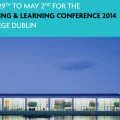It’s been an eventful year in the life of The Really Useful #EdTechBook. I wanted to just look back and collect my thoughts, and give you an insight into what it means to me, and to others.
The idea
My original idea was to write about my thoughts on the use of learning / educational technology. I then realised that, for me, the world of learning technology or technology enhanced learning (or just ‘learning’, as some prefer now) is about the people I connect with and learn from. Plus, you’ve probably read enough from me these days!
So, my original idea morphed into a collaborative project where contributors brought their own experiences, knowledge, and unique perspectives to the fore, for you to learn from.
From initial conversations, tweets, emails, etc. came the idea and concept for The Really Useful #EdTechBook. Each chapter was set aside for each invited contributor to have for themselves, no real limits were imposed, but ideally between 2,000-5,000 words. I wasn’t asking for anything in particular, I didn’t want to direct or control the flow of ideas or perspectives, other then each author’s own words on their own interpretation of the book title. I was hoping that, once the chapters came in, I could apply a narrative to their order – thinking of (1) the background / history to the use of technology, (2) the current field and areas we work, and finally (3) looking forward to what we can expect or hope for in the future. As is turned out the stories and experiences were echoing and supporting each other that it became obvious there is an underlying thread of our work; that technology has not only enabled us but also constricted us in our outlook – from repeating mistakes to growing concepts and inclusion of stakeholders in all aspects of our work. Continue reading






















 As part of a new series of posts, I will be talking to authors of
As part of a new series of posts, I will be talking to authors of 





 Photowall for Chromecast (iPhone/iPad): I recently wrote about the
Photowall for Chromecast (iPhone/iPad): I recently wrote about the 
